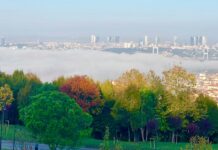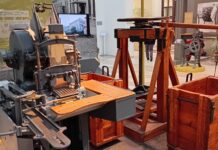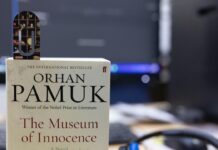In Turkish, the word ‘korkma’ means ‘don’t be scared.’ How I learned this makes for an interesting story—one which strengthened my belief that people, in general, are inherently good.
Not too long ago, I woke up one morning to loud, scary noises accompanied by the shaking of the bed. For a moment, I thought it was an earthquake. The floor and the walls shook vigorously, so did the furniture; the doors and the windows rattled. All this while, the horrible noise continued. Still trying to figure out the source and the reason for the sound, I quickly started making a mental list of the absolutely important things that I’d need to grab in case I had to run downstairs. And then I looked outside the kitchen window of my third-floor apartment.
There was a huge machine on the roof of the building next door, which had been torn down bit by bit for the past many days (until they decided to bring in the big guns—machines, in this scenario). Every time the huge machine tried to bring a wall down, all the adjacent buildings, including ours, shook violently. My new worry was, what if our building couldn’t withstand the strain it was being put under? Most of the buildings in my neighborhood are relatively old, so my fear wasn’t entirely unfounded.
Panicked, I texted my neighbor—a (very kind) Moldovan woman named Olya, who was married to a Turkish man living with his elderly mother in the next-door apartment. She reassured me that our building, though old, was strong enough and wouldn’t be affected by the demolition work. That calmed me down. However, I found out shortly that she wasn’t entirely sure herself!
As I left home to run some errands after a while, I found her husband standing in the street, looking up at the demolition work. Turned out, since she was at work, she called her husband (who must have been at work as well) and asked him to go home and see what was going on. When he saw me, he explained to me that our building was safe, that all of this would end within a few days, and that there was nothing to worry about.
The five-minute-long conversation took place mainly through signs and gestures, but it wasn’t a silent exchange by any means. He kept explaining the situation to me in Turkish while gesticulating so that I understood what was being said; the only English word he knew was ‘problem,’ and he kept saying ‘problem yok,’ which loosely translates into ‘no problem.’
Early next morning, our doorbell rang. It was the neighbors, Olya and her husband, Ahmet Bey. It looked like they were about to leave for work. They had stopped by to ask me not to be scared of the tremors. This time, Ahmet Bey kept saying ‘korkma.’ I didn’t know what it meant, but I took note of its sound and checked later to learn that it meant ‘don’t be scared.’
That same evening, Olya again dropped by when she returned from work to check in on us. She brought some Turkish sweets too!
Meanwhile, the demolition went on, and since my initial shock and worries had subsided, the way it was progressing started to fascinate me. There was a method to the destruction: at first, all the salvageable stuff like doors, windows, wooden floor panels, etc., were removed. Then, a few walls were torn down. And then the entire structure was brought down using the noise-making machine.
Three days into the demolition, the fascination gave way to worry again as the walls adjacent to our building were being torn down. This time, the vibrations were too violent to not be scared.
To make matters worse, cracks began to appear on our walls and in the columns, which became deeper with every thrust of the machine. I did what I always did in this situation: send an SOS note to Olya. Within a few minutes, the machine stopped. And after a few minutes of that, Ahmet Bey was at our door with the demolition supervisor from the other building. He asked our permission to bring the guy into the house.
Once inside, he showed the cracks to the supervisor. They discussed the issue for some time, after which the supervisor left. Ahmet Bey turned to us and, using gestures, explained that the crack was not deep enough and that the construction guys would come and repair it once they had finished razing down the building. He kept saying, “korkma, korkma.”
The demolition work went on for a week. During that time, every time I came across Ahmet Bey on the stairs or in the street, he would say (and gesticulate) a lot regarding the demolition, but the only word I understood was ‘korkma.’ And that was reassuring, indeed.
The building was finally razed to the ground, the cracks on our walls were repaired, and we eventually moved out of that apartment. But the interactions I’ve had with our neighbors during those ten or so days were a pleasant surprise for me.
The reason being, before the demolition, we hardly had any contact with our neighbors. In fact, our interactions were limited to the exchange of food on special occasions: e.g., I gave them sheerkhurma—a Pakistani dessert made with milk and vermicelli—on the occasion of Eid, and they returned the bowl with Turkish bayram delicacies. Another time, they gave us aşure, a Turkish sweet dish made in the month of Muharram. Yet another time, they gave us some traditional ice cream, and I sent them some Pakistani pulao.
In the absence of verbal communication owing to our unfamiliarity with each other’s languages, that’s how we communicated. Therefore, I was touched by their constant concern for us.
After living in that apartment for close to a year, we moved into another one. I messaged Olya about our move and told her I wanted to say goodbye to them in person. It was a somber meeting, and I took my leave from them with a heavy heart.
And yet, I felt grateful for having such kindhearted people as our neighbors in a new country who were there for us ‘yabancıs’ whenever we needed them.










